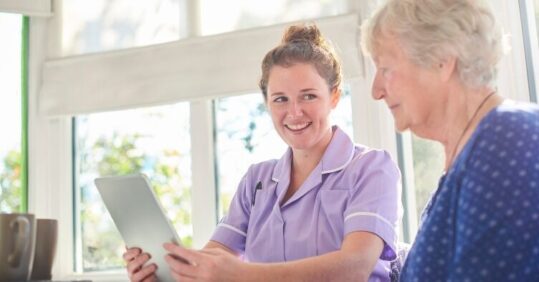Nurse recruitment drive launches for virtual wards in the Midlands

A collaboration on NHS trusts in the Midlands have launched a recruitment drive to hire more nurses – including from community settings – to work in virtual wards.
The Midlands Partnership and University Hospitals of North Midlands NHS Trusts are looking to hire 95 new nurses, with acute or community training and experience, to primarily work with sub-acutely or acutely ill patients.
It is hoped that this will allow the creation of 470 virtual ‘beds’, where patients can receive hospital levels of care and support from their homes.
Nurses involved in the scheme will be community-based and liaise with community health services when required. Those who drive to visit patients will also be eligible for a mileage allowance.
Related Article: New preceptorship package for social care nurses
The recruitment drive will hire nurses at Agenda for Change bands 6, 7 and 9, specifying that:
- Band 6 will be required to have qualifications in physical health assessment
- Band 7 will be expected to have taken the V300 prescribing course
- Band 8 will be advanced clinical practitioners
Dr Zia Din, a consultant at Royal Stoke University Hospital and clinical lead for the virtual wards project, said: ‘The virtual wards will provide an infrastructure for us to care for a proportion of our patients who have urgent care needs but without admitting them to hospital.’
Speaking on BBC Radio Stoke on Tuesday, Lesley Roberts, head of operations at Midlands Partnership said that ‘we know when we initially go live patients will still want to see a person coming to visit them in their own home.
‘But as we move forward and gain the confidence of the public, patients and family we are looking to procure a clinical piece of kit to support patients to be able to monitor patients.’
Related Article: Applications to study nursing in England at ‘new low’
Dr Zin said that patients will be ‘assessed by practitioners who will use digital technologies to support care’, and that care plans ‘will be discussed with consultants so the patient receives the same care as they would in a hospital environment’.
The trusts have already held one recruitment day on the 28 September, but there is another planned on 5 October at the Pirelli Stadium (Burton Albion FC) in Burton-upon-Trent.
This comes amid a push for more virtual awards across the NHS. In April, NHS England and NHS Improvement asked all Integrated Care Systems to extend or introduce the virtual wards model, so capacity equivalent to 40 to 50 virtual ward ‘beds’ per 100,000 population (equal to up to 24,000 virtual ward beds) was delivered by December 2023.
Speaking in August about the effort to create 7,000 more beds – including on virtual wards – over the coming months, Professor Sir Stephen Powis, NHS national medical director, said: ‘Ahead of the winter, we want to make sure we are doing everything we possibly can to free up capacity so that staff can ensure patients get the care they need – this includes timely discharge, working with social care, and better support in the community with the expansion of virtual wards.’
Related Article: Paul Rees appointed as permanent NMC chief executive and registrar

See how our symptom tool can help you make better sense of patient presentations
Click here to search a symptom




